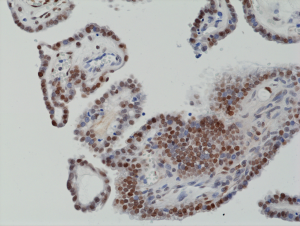anti-c-Fos (human) Rabbit Monoclonal (RM374)
| Code | Size | Price |
|---|
| REV-31-1260-00-R100 | 100 ul | £455.00 |
Quantity:
Prices exclude any Taxes / VAT
Overview
Antibody Isotype: Rabbit IgG
Antibody Clonality: Recombinant Antibody
Antibody Clone: RM374
Regulatory Status: RUO
Target Species: Human
Applications:
- Immunohistochemistry (IHC)
- Western Blot (WB)
Shipping:
Blue Ice
Storage:
+4°C
Images
Documents
Further Information
Alternate Names/Synonyms:
Proto-oncogene c-Fos; G0/G1 Switch Regulatory Protein 7
Concentration:
N/A
EClass:
32160000
Form (Short):
liquid
Formulation:
Liquid. 50% Glycerol/PBS with 1% BSA and 0.09% sodium azide.
Handling Advice:
Avoid freeze/thaw cycles.
Immunogen:
A peptide corresponding to N-terminus of human Proto-oncogene c-Fos.
Long Description:
Recombinant Antibody. This antibody reacts to human Proto-oncogene c-Fos. It may also react to mouse and rat c-Fos, as predicted by immunogen homology. Applications: WB, IHC. Source: Rabbit. Liquid. 50% Glycerol/PBS with 1% BSA and 0.09% sodium azide. The Fos family of nuclear oncogenes includes c-Fos, FosB, Fos-related antigen 1 (FRA1) and Fos-related antigen 2 (FRA2). The expression of Fos proteins is rapidly and transiently induced by a variety of extracellular stimuli including growth factors, cytokines, neurotransmitters, polypeptide hormones and stress. Fos proteins dimerize with Jun proteins (c-Jun, JunB, and JunD) to form Activator Protein-1 (AP-1), a transcription factor that binds to TRE/AP-1 elements and activates transcription of several genes that play an important role in cellular signal transduction, cell proliferation and differentiation. c-Fos has been shown to be phosphorylated by various stimuli including growth factors and insulin at atleast seven different sites. The best known upstream kinase for phosphorylation at Thr232 is ERK MAPK which regulates localization of c-Fos to the nucleus and is thus important for c-Fos induced transcriptional activity. Phosphorylation of c-Fos at Ser32 and Thr232 by Erk5 increases protein stability and nuclear localization. c-Fos plays an important role in many cellular functions and has been found to be overexpressed in a variety of cancers.
NCBI, Uniprot Number:
P01100
Package Type:
Vial
Product Description:
The Fos family of nuclear oncogenes includes c-Fos, FosB, Fos-related antigen 1 (FRA1) and Fos-related antigen 2 (FRA2). The expression of Fos proteins is rapidly and transiently induced by a variety of extracellular stimuli including growth factors, cytokines, neurotransmitters, polypeptide hormones and stress. Fos proteins dimerize with Jun proteins (c-Jun, JunB, and JunD) to form Activator Protein-1 (AP-1), a transcription factor that binds to TRE/AP-1 elements and activates transcription of several genes that play an important role in cellular signal transduction, cell proliferation and differentiation. c-Fos has been shown to be phosphorylated by various stimuli including growth factors and insulin at atleast seven different sites. The best known upstream kinase for phosphorylation at Thr232 is ERK MAPK which regulates localization of c-Fos to the nucleus and is thus important for c-Fos induced transcriptional activity. Phosphorylation of c-Fos at Ser32 and Thr232 by Erk5 increases protein stability and nuclear localization. c-Fos plays an important role in many cellular functions and has been found to be overexpressed in a variety of cancers.
Purity:
Protein A purified.
Source / Host:
Rabbit
Specificity:
This antibody reacts to human Proto-oncogene c-Fos. It may also react to mouse and rat c-Fos, as predicted by immunogen homology.
Transportation:
Non-hazardous
UNSPSC Category:
Primary Antibodies
UNSPSC Number:
12352203
Use & Stability:
Stable for at least 1 year after receipt when stored at -20°C.



